

Getting Started in a Reimagined Cyrodiil
Now that you have a sense of what’s new and improved in The Elder Scrolls IV: Oblivion Remastered, it’s time to take your first steps into the sprawling world of Cyrodiil. Whether you’re a longtime fan adjusting to the updated mechanics or a brand-new adventurer unfamiliar with the lands of Tamriel, knowing how to begin can make all the difference. Below are essential tips and guidance to help you survive, thrive, and make the most of your journey in this beautifully reimagined RPG classic.
Character Creation: Laying the Foundation
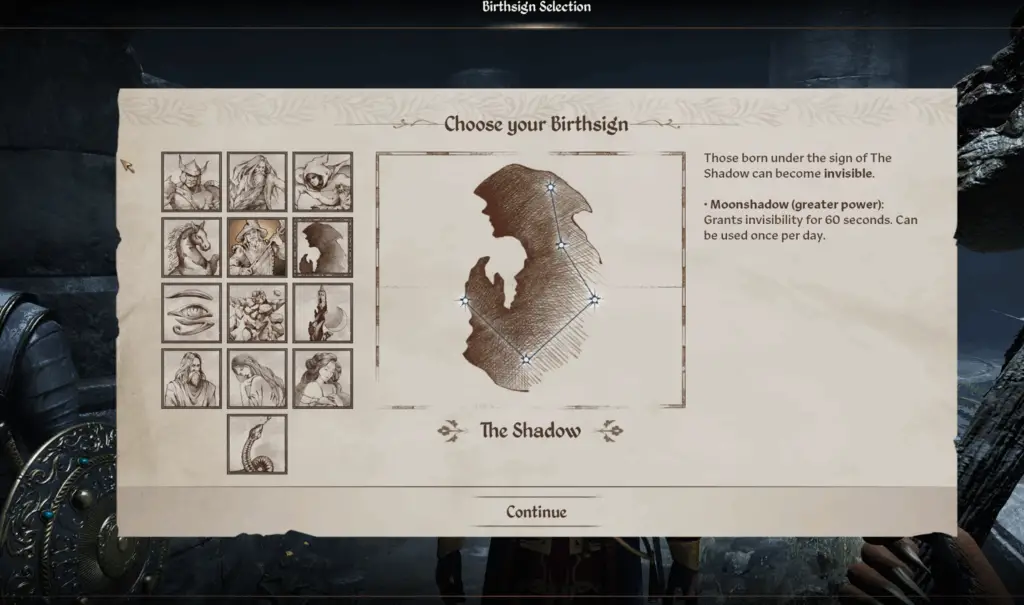
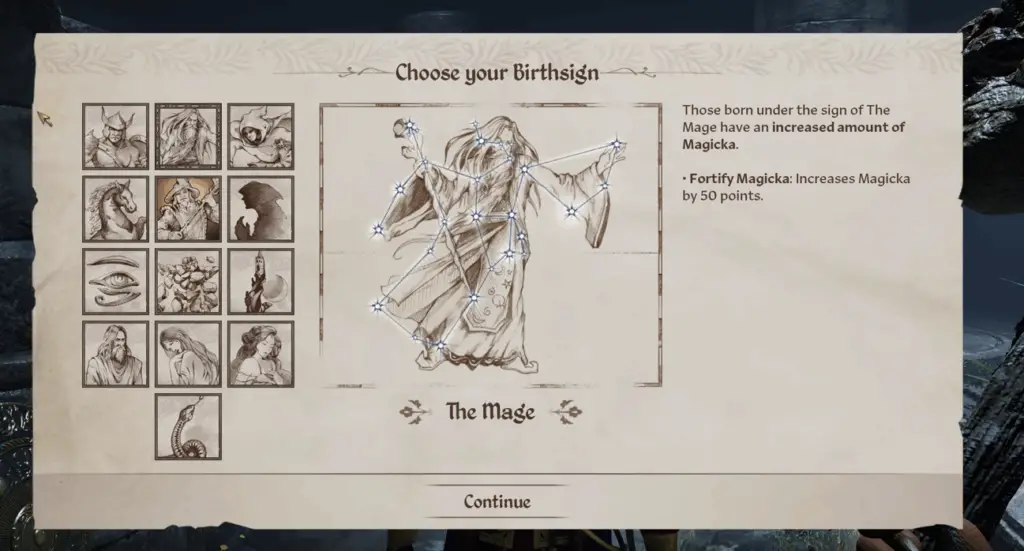
Your initial choices in race, birthsign, and class significantly influence your gameplay experience
Race: Each race offers unique attributes. For instance, Altmer (High Elves) possess strong magical affinities, while Khajiit excel in stealth
Birthsign: This determines your starting bonuses. The Warrior enhances combat abilities, whereas The Mage boosts magical prowess.
Class: Selecting a class defines your major skills. Consider creating a custom class to tailor your character to your preferred playstyle
Race Selection

There are ten playable races in Oblivion Remastered, each offering unique abilities, attribute bonuses, and skill proficiencies. Your choice of race influences your character’s strengths and weaknesses, as well as interactions with NPCs. Below are all
Human Races:
Imperial: Balanced attributes; excels in Mercantile and Speechcraft.
Breton: Strong magical resistance; proficient in Conjuration and Mysticism.
Redguard: High Endurance and Strength; adept with Blades and Athletics.
Nord: Resistant to frost; skilled in Heavy Armor and Blunt weapons.
Elven Races
High Elf (Altmer): High Magicka pool; bonuses in Destruction and Alteration.
Dark Elf (Dunmer): Balanced combat and magic; resistant to fire.
Wood Elf (Bosmer): Excellent archers; bonuses in Marksman and Sneak.
Beast Races
Khajiit: Exceptional agility; excels in Acrobatics and Security.
Argonian: Immune to poison and disease; proficient in Alchemy and Athletics.
Orc: High durability; bonuses in Heavy Armor and Armorer.
Note: In the remastered edition, the traditional gender-based stat differences have been replaced with “Origins,” offering additional customization option
Tip: Before finalizing your choices, explore the tutorial area thoroughly. This allows you to test different playstyles and make informed decisions
Class Specializations

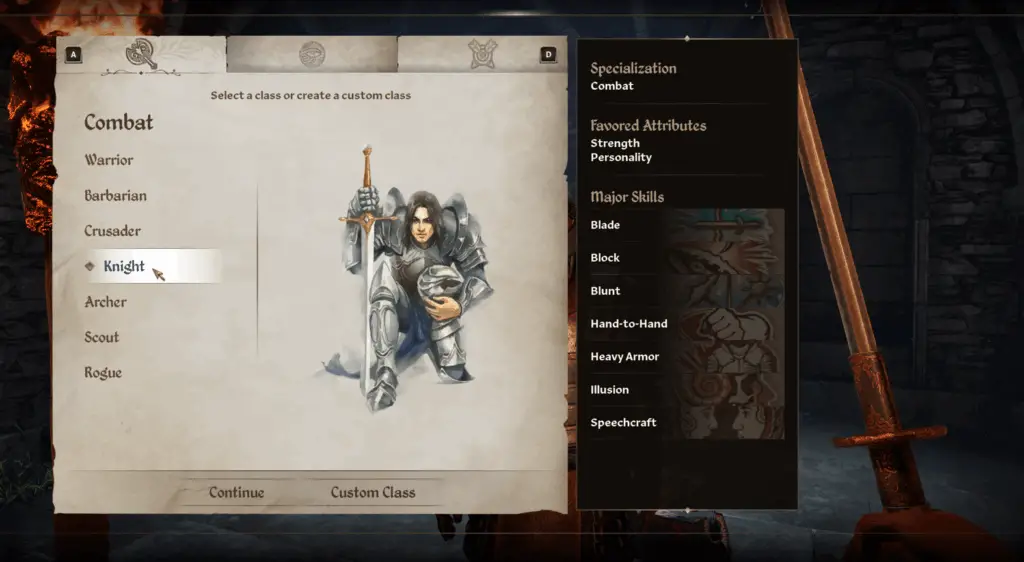
Classes in Oblivion Remastered are categorized into three specializations: Combat, Magic, and Stealth. Each specalizations offered Seven classes bringing the total classes to 21
Each class comes with favored attributes and a set of major skills that define your character’s abilities.
Combat Specialization
Warrior: Emphasizes melee combat and durability.
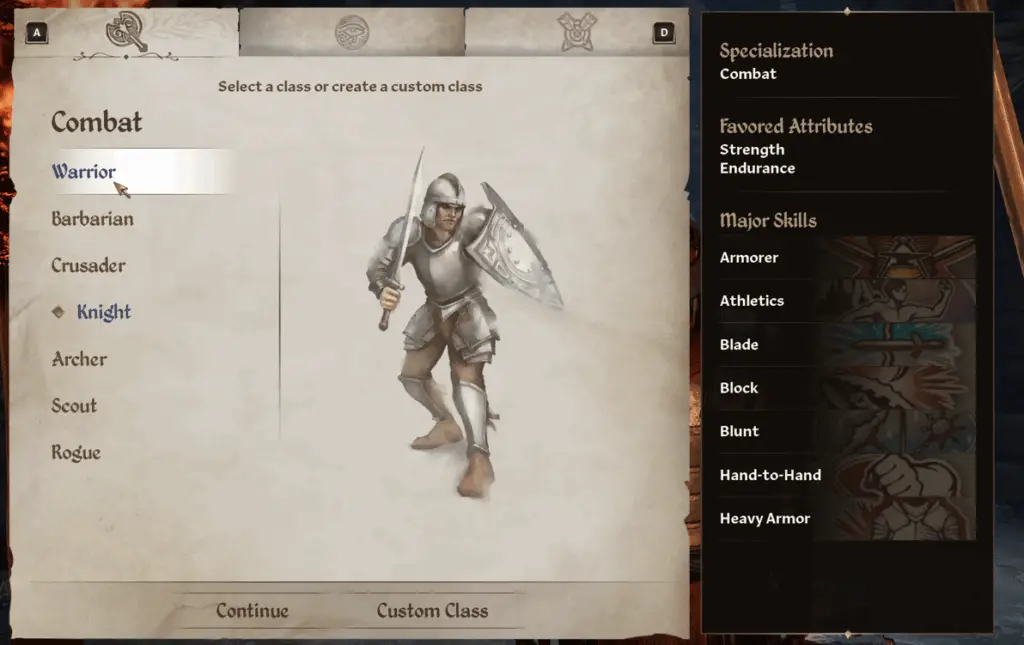
Barbarian: Drop the armor and focus on brutal Strenght and Combat prowess
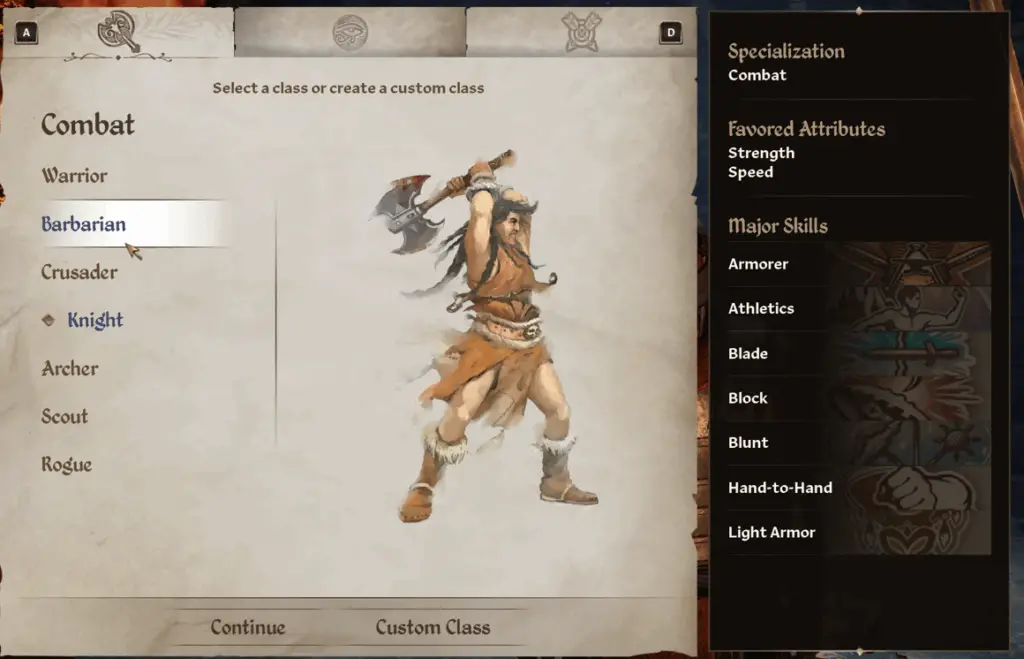
Crusader: Combines combat prowess with healing abilities
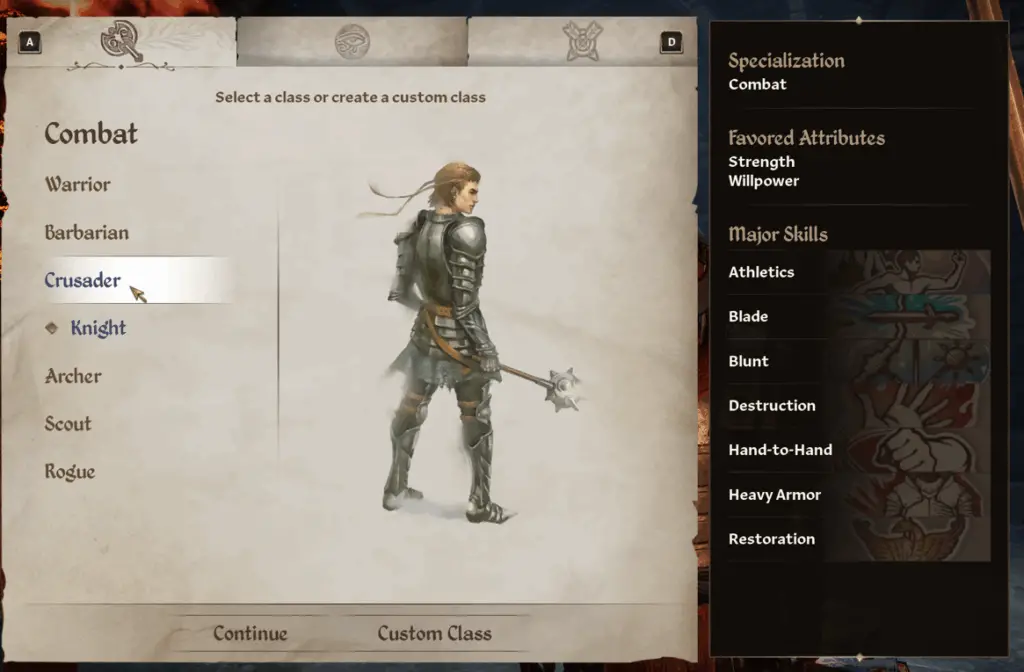
Knight: Focuses on honor and heavy armor usage.

Archer: Focuses on Light Armor and Archery.
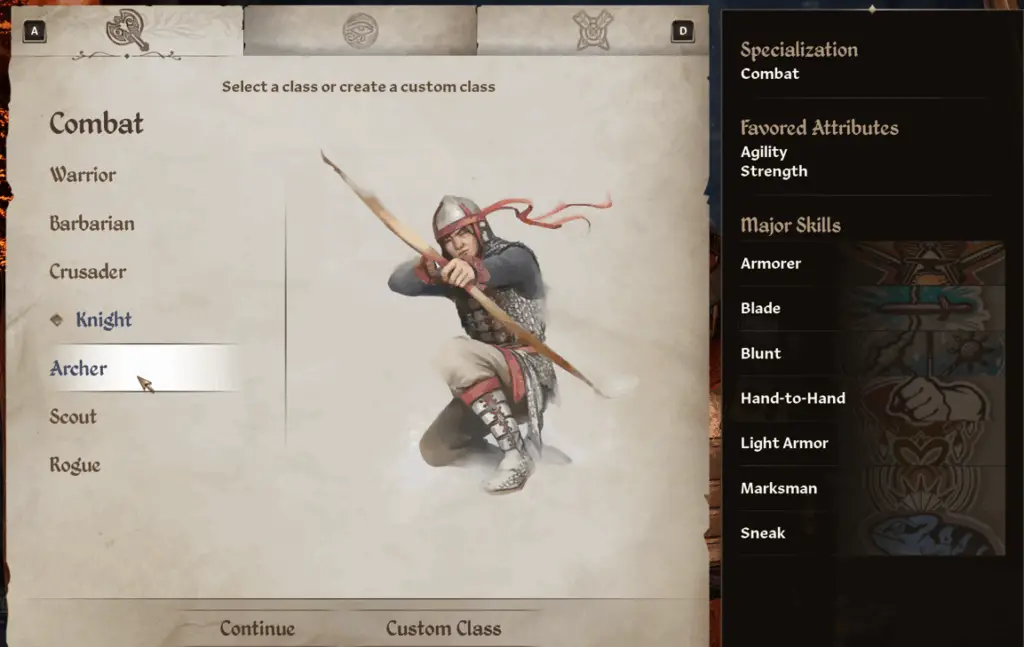
Scout: Add Alchemy to the mix and has a general higher speed
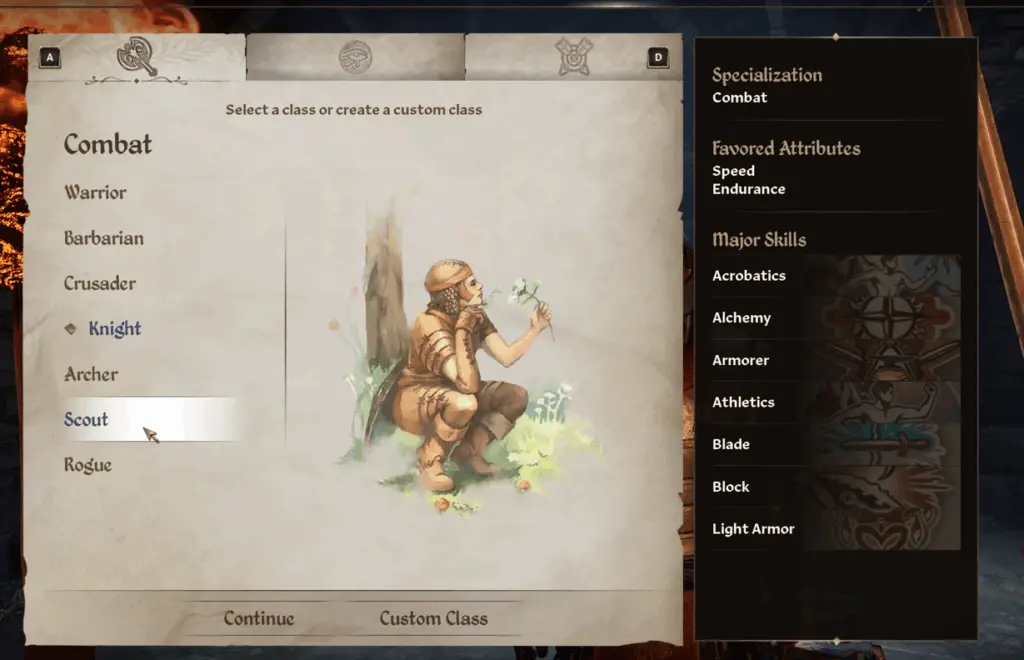
Rogue: Add in some charisma to the mix and the ability to create Illusions
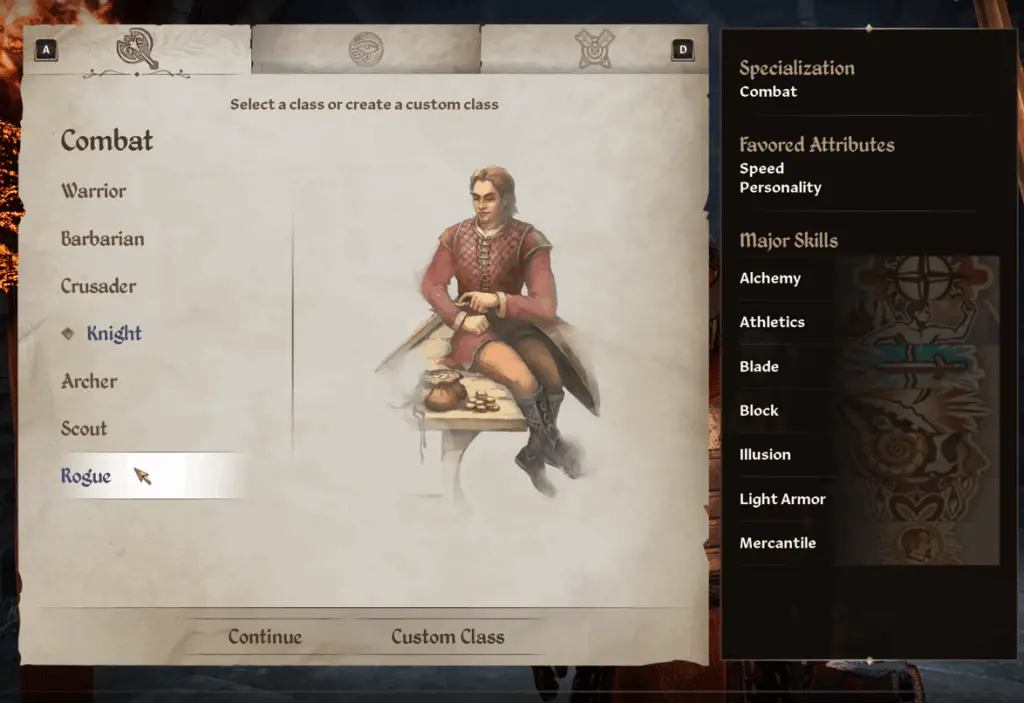
Magic Specialization
Mage: Masters of all schools of magic.
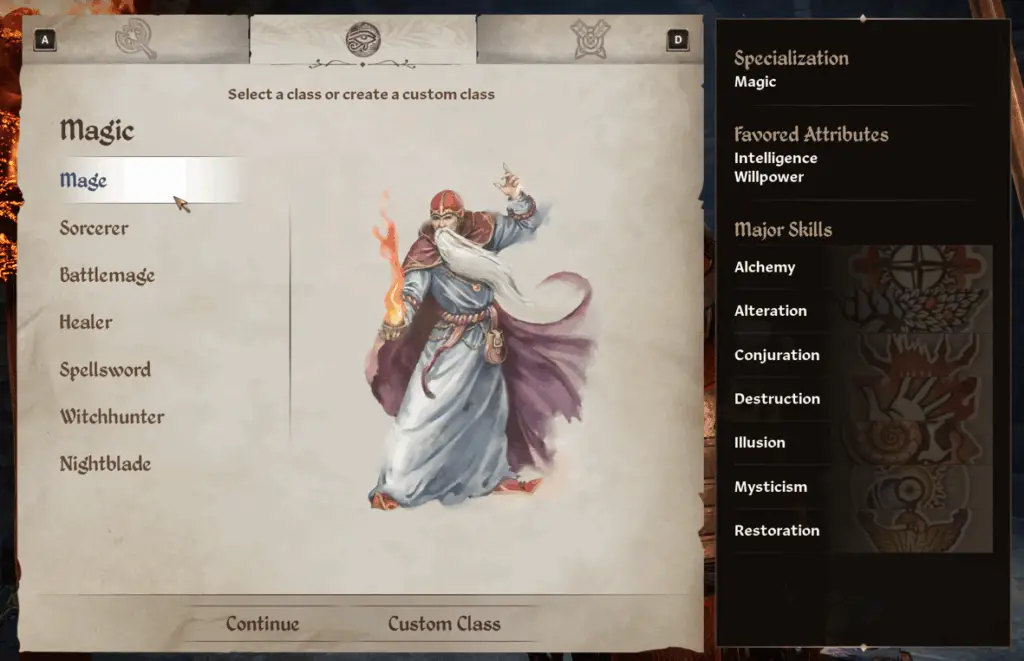
Sorcerer: Specializes in destructive spells and enchantments.
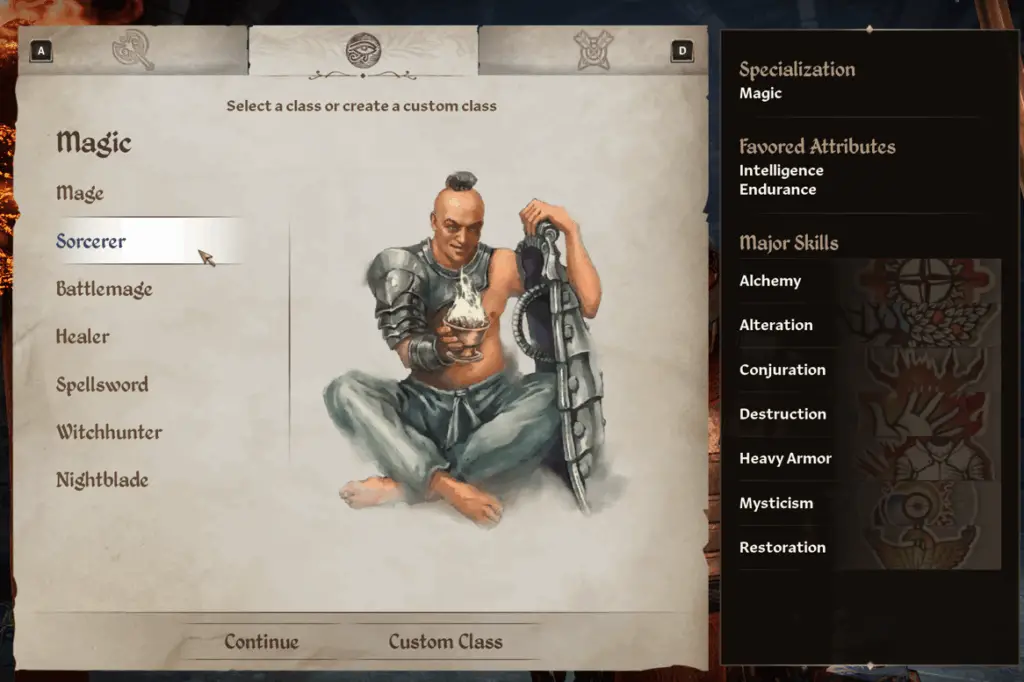
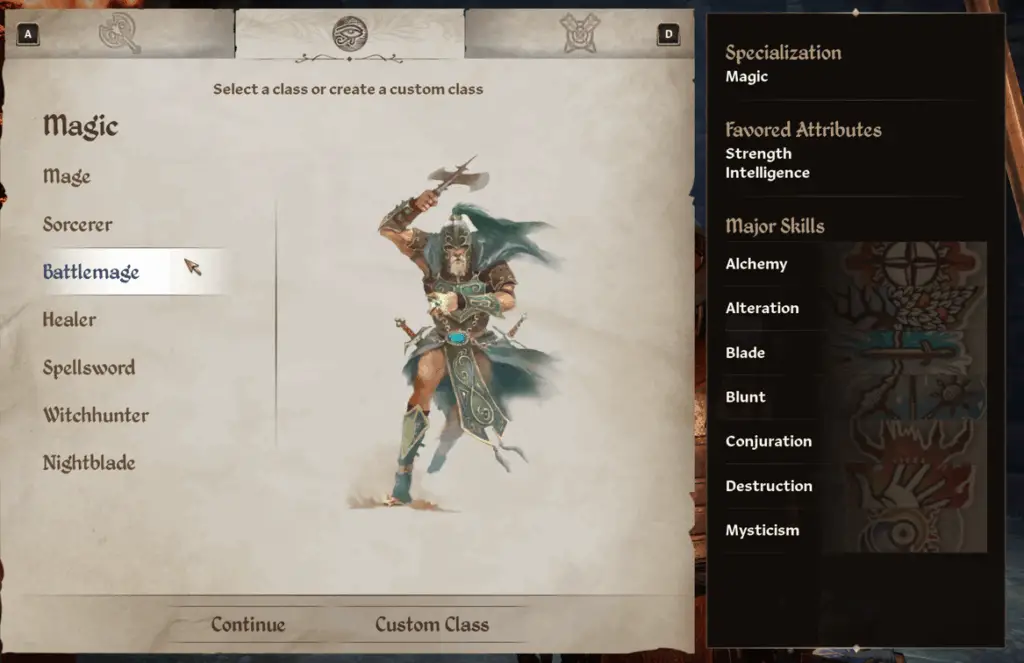
Healer: Focuses on Restoration and support magic
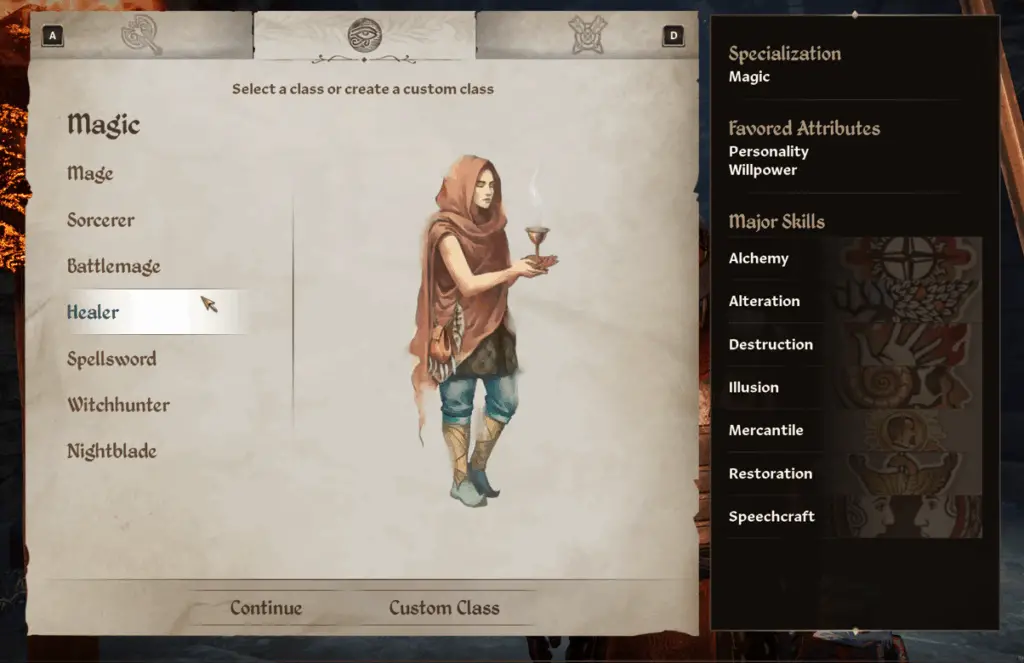
Spellsword: Combine Knight with Destruction Spell, Also has access to Restoration capacity
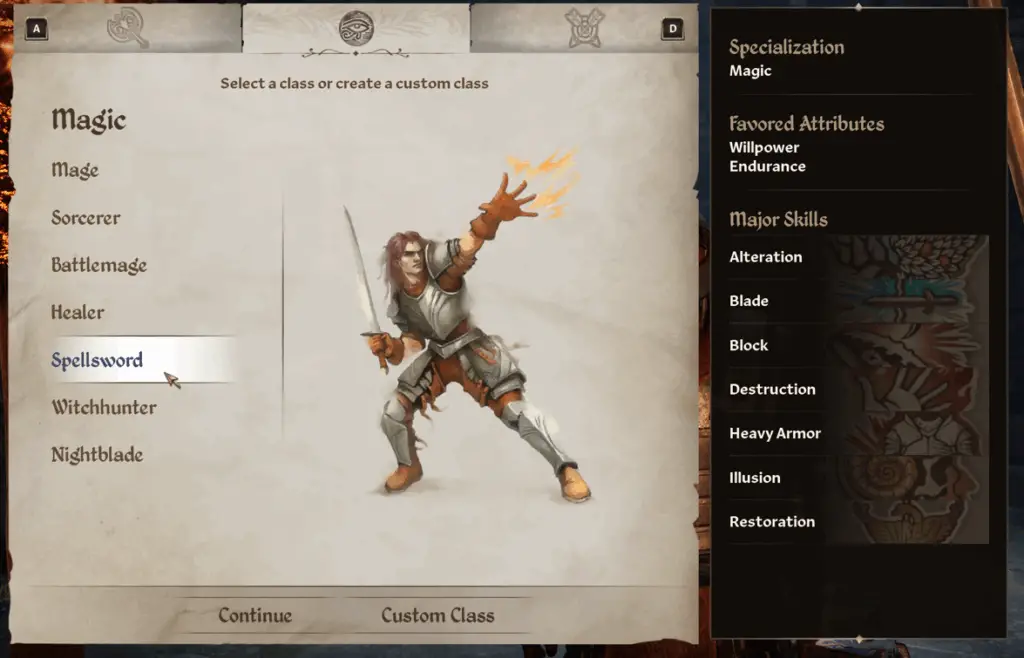
Witchhunter: Magic users with some “Rogue” abilities (Alchemy, Athletics & Maskman)

Nightblade: Generally an “Assasin” Class with Alchemy and Magic.
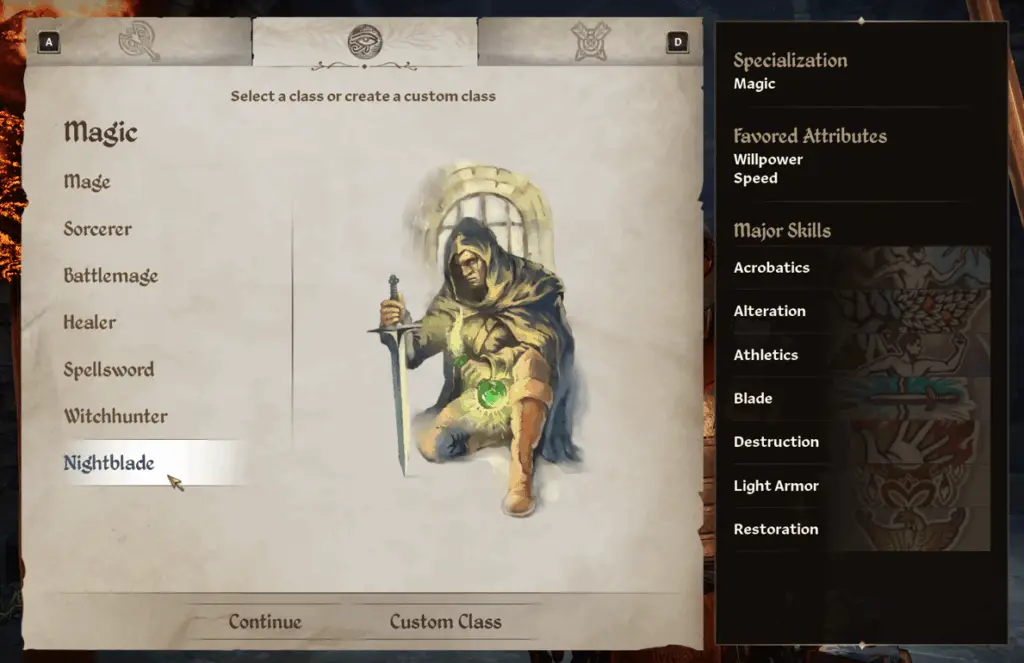
Stealth Specialization
Thief: Experts in sneaking and lockpicking.
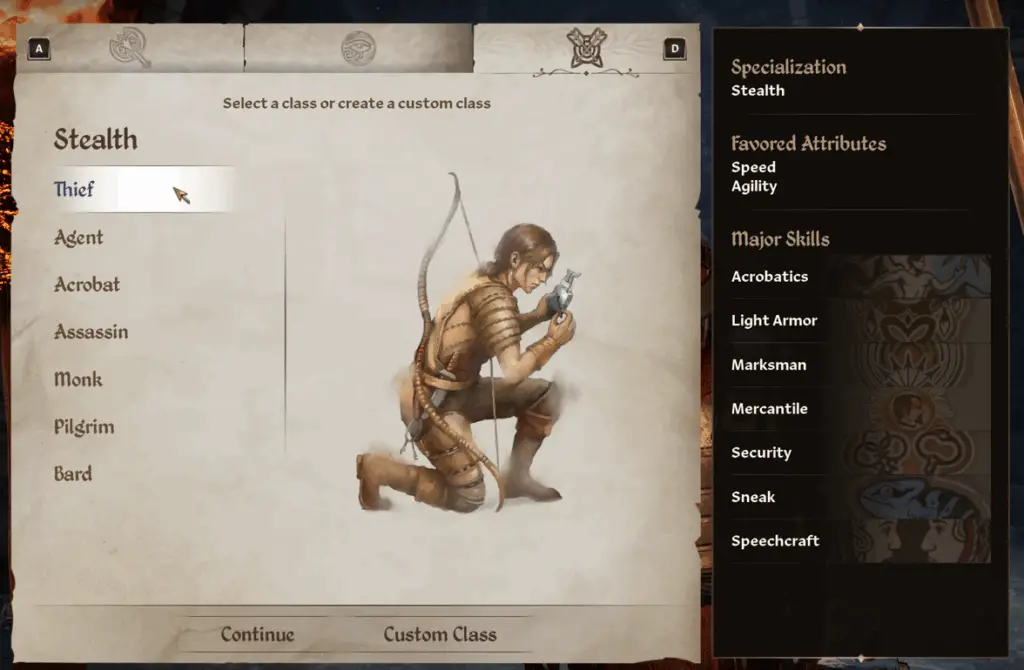
Agent: Masters of stealth kills and agility.
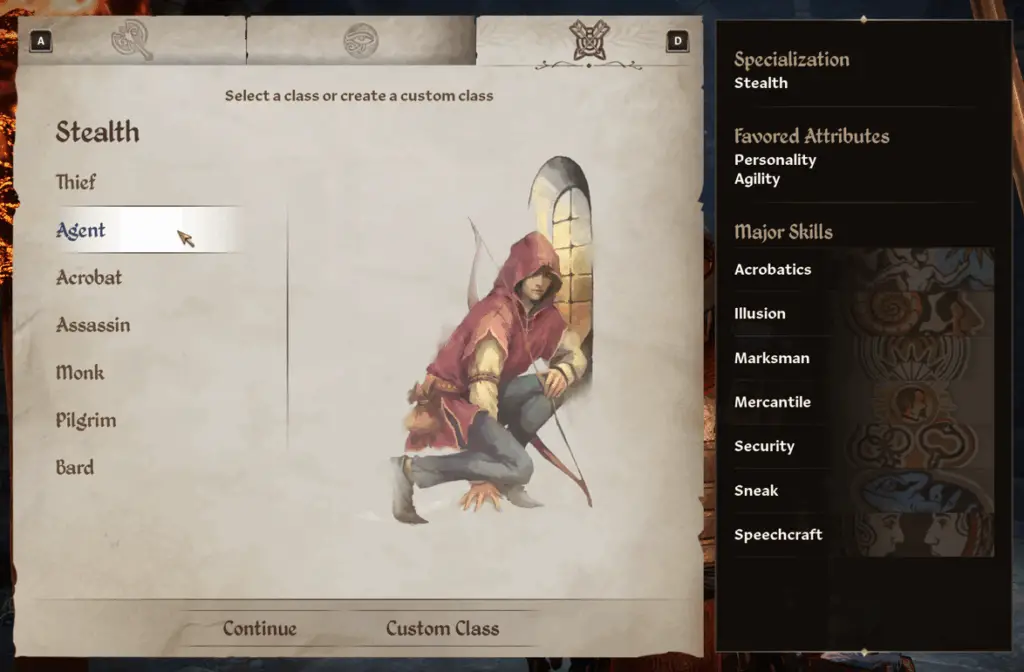
Acrobat: Kind of similar to Agent, but has a “Silvertongue”
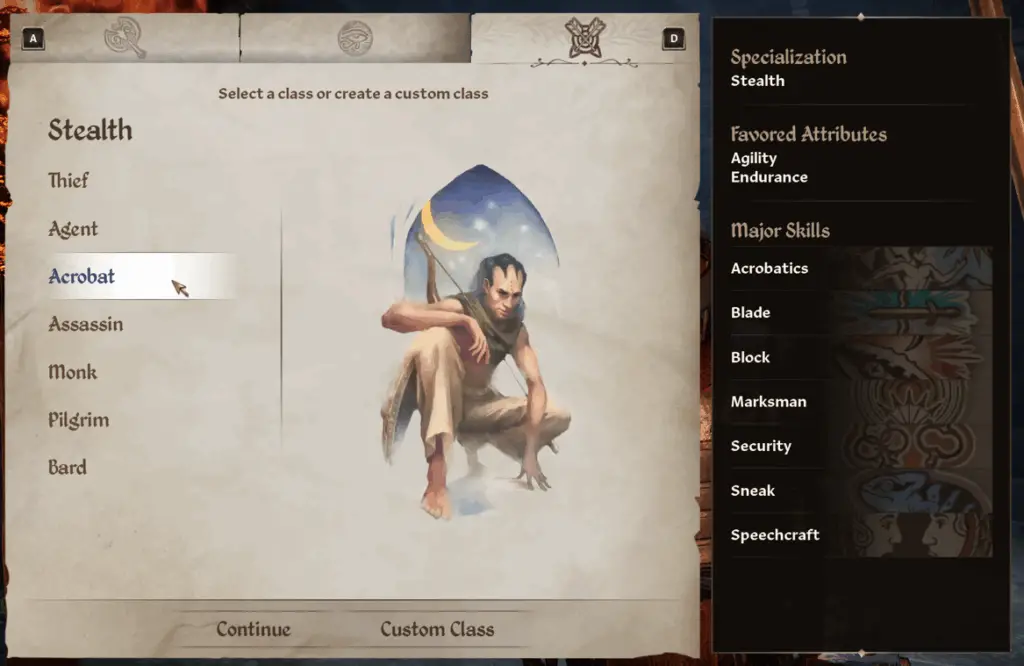
Assassin: Not much for explanation.
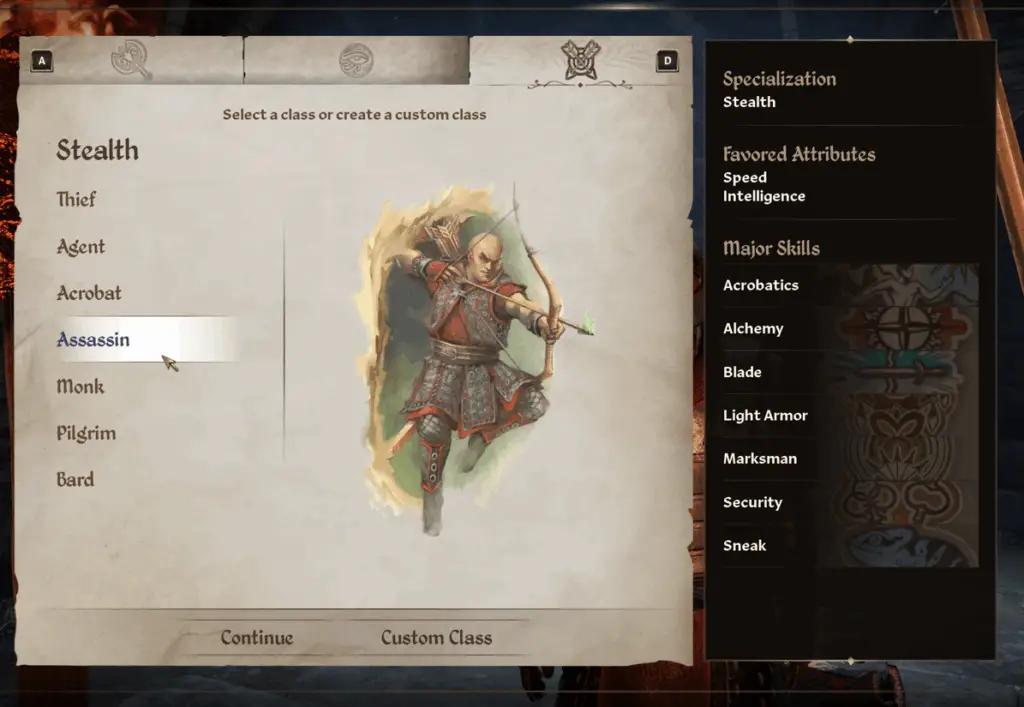
Monk: An unique spin on the “Stealth” section
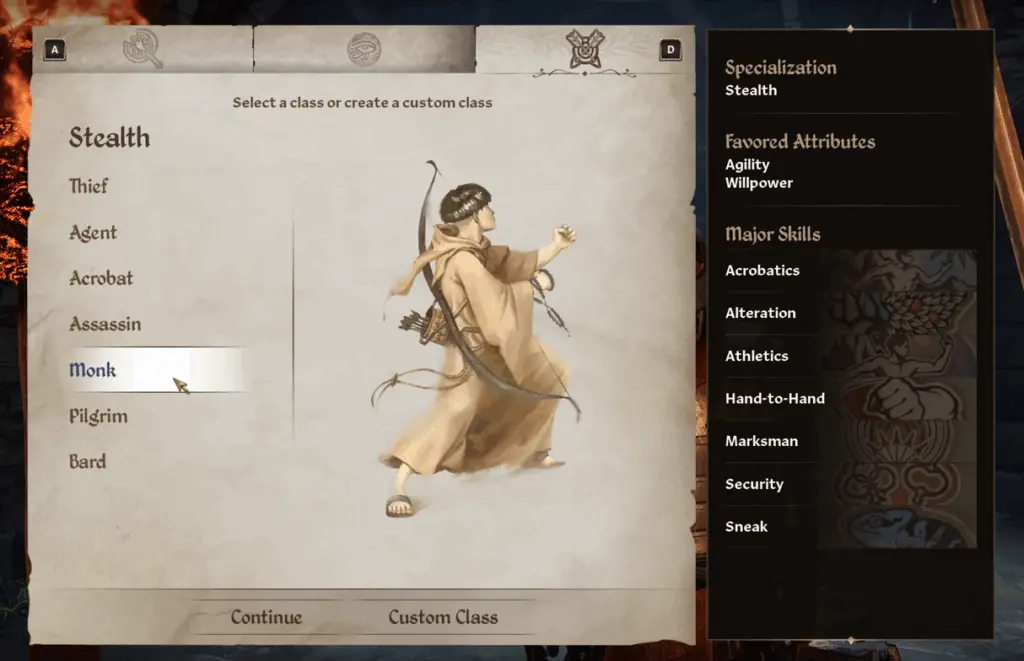
Pilgrim: Focus on Blunt Weapon and a Persuasive capacity (Speechcraft)
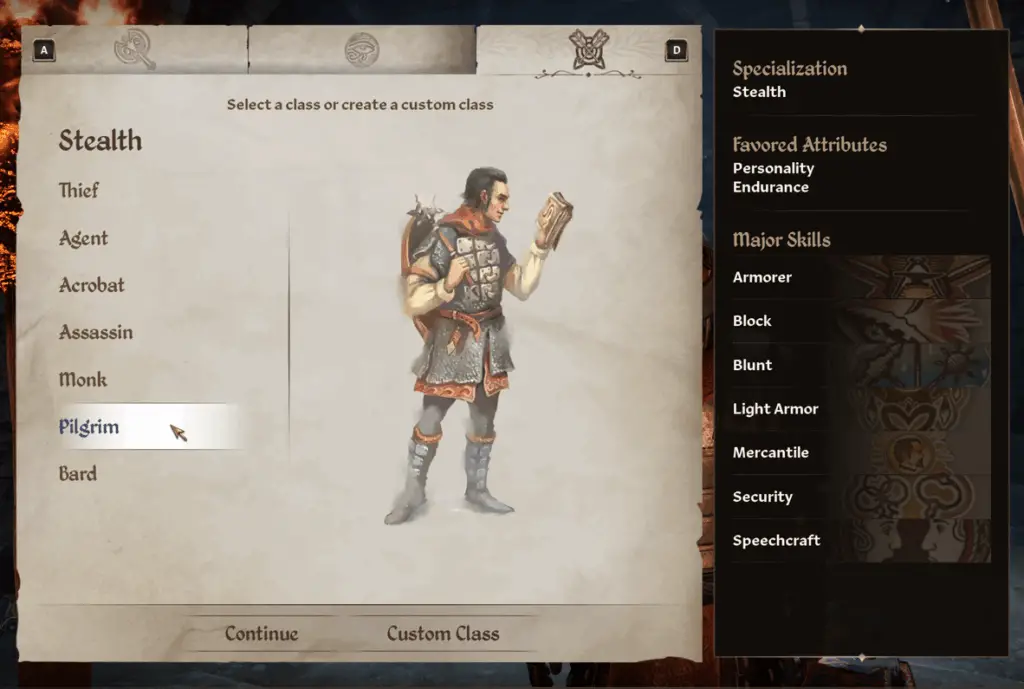
Bard: You traditional Bard in DnD – with a little focus on Combat (Blade, Block)
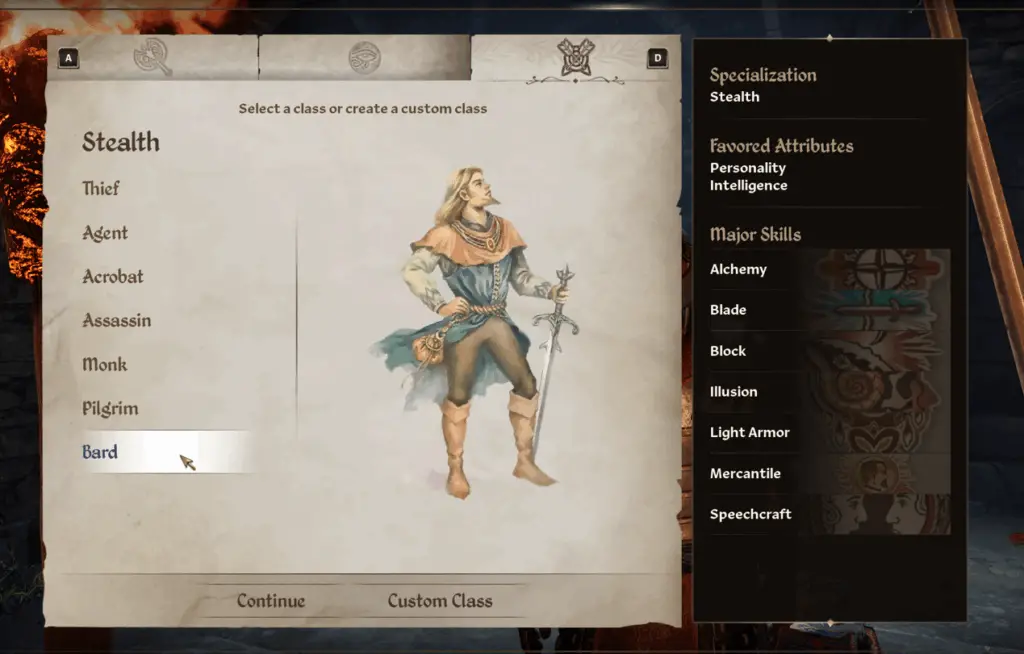
Players can also create custom classes, selecting their own combination of major skills and favored attributes to tailor their experience.
Major Skills

Upon class selection, you’ll choose seven major skills from a pool of 21. These skills determine how your character levels up, as increasing these skills contributes to your overall level progression.
Combat Skills:
Blade: Proficiency with swords and daggers.
Blunt: Expertise with maces and hammers.
Hand to Hand: Unarmed combat skills.
Armorer: Ability to repair weapons and armor.
Heavy Armor: Usage of durable, protective gear.
Block: Defensive skill to parry attacks.
Athletics: Enhances running and swimming capabilities.
Magic Skills:
Destruction: Offensive spells like fire and lightning.
Restoration: Healing and fortifying spells.
Alteration: Utility spells affecting physical properties.
Conjuration: Summoning creatures and weapons.
Illusion: Spells that manipulate perception.
Mysticism: Spells for detection and soul manipulation.
Alchemy: Crafting potions and poisons.
Stealth Skills:
Sneak: Ability to move undetected.
Security: Lockpicking skills.
Marksman: Proficiency with bows.
Light Armor: Usage of agile, less restrictive armor.
Acrobatics: Enhances jumping and dodging.
Mercantile: Bartering and trading skills.
Speechcraft: Influencing and persuading NPCs
Tip: Choose major skills that align with your intended playstyle, as they will level up faster and contribute to your character’s growth.

Exploration Strategy: Navigating Cyrodiil in Oblivion Remastered
TL;DR
Save Often: Utilize multiple save slots to safeguard against unforeseen challenges or decisions you might want to revisit
Join Guilds: Organizations like the Fighters Guild and Mages Guild offer structured questlines, valuable rewards, and skill advancements.
Explore Thoroughly: Cyrodiil is rich with hidden treasures, dungeons, and side quests. Taking time to explore can yield significant benefits.
Manage Inventory: Regularly organize your inventory to avoid becoming over-encumbered. Selling or storing unnecessary items can streamline your adventures.
Exploration is a cornerstone of the Oblivion experience (could basically apply to all Elder Scroll titles) With the remastered edition enhancing visuals and performance, venturing through Cyrodiil has never been more rewarding. Here’s how to approach exploration effectively:
Embrace the Journey Over the Destination
While fast travel is available, consider traversing the landscape on foot or horseback. This approach allows you to:
Discover Hidden Locations: Uncover caves, ruins, and shrines not marked on your map.
Engage with Random Encounters: Encounter traveling merchants, wandering NPCs, or unexpected ambushes.
Collect Alchemical Ingredients: Gather herbs and other resources for potion-making.
The remastered visuals make these journeys visually stunning, enhancing immersion.
Prioritize Points of Interest
Certain locations offer unique experiences:
Vilverin: An Ayleid ruin near the Imperial City, ideal for early-game dungeon crawling and loot.
Daedric Shrines: Scattered across Cyrodiil, these shrines offer quests with powerful rewards.
Cities and Towns: Each settlement has its own culture, quests, and characters to interact with.
Engaging with these areas provides deeper insight into the game’s lore and offers substantial rewards.
🧙♂️ Join Guilds and Factions
Guilds offer structured questlines and unique benefits:
Mages Guild: Access to spell crafting and magical resources.
Fighters Guild: Combat-focused missions and training.
Thieves Guild: Stealth-oriented quests and fencing stolen goods.
Dark Brotherhood: Assassination contracts with a rich narrative.
Joining these factions not only provides quests but also enhances your character’s abilities and resources.
Combat and Skill Development
TL;DR
Practice Makes Perfect: Skills improve through use, but don’t specialize
Weapon Maintenance: Weapons and armor degrade over time. Carry repair hammers and using hotkeys to trivialize this tasks
Spellcrafting: Joining the Mages Guild grants access to spell-making eventhough your buid focus on Melee.
Stealth Mechanics: For stealth-oriented characters, utilize shadows and crouch-walking to remain undetected.
Skill Leveling Tips: Play Smart, Not Just Fast
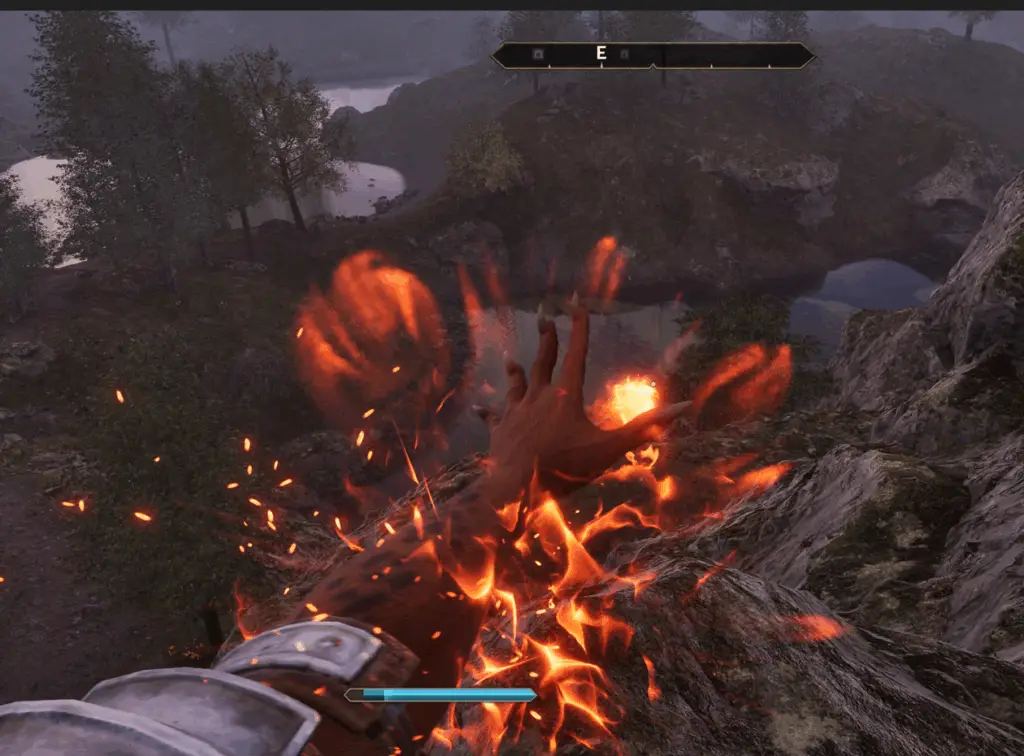
Leveling in The Elder Scrolls IV: Oblivion Remastered can be both rewarding and punishing if misunderstood. Here’s how to approach it wisely:
Don’t Rush to Level one Single Skill
It might be tempting to grind Alchemy, Speechcraft, or other non-combat skills early on—but doing so can backfire. Oblivion uses aggressive level scaling, meaning the world levels with you.
Enemies become tougher based on your character level, not your combat readiness. If your level 10 hero is great at brewing potions but can barely swing a sword, expect a world filled with upgraded foes like Clannfears and Atronachs instead of lowly Scamps.
Tip: Focus on leveling skills tied to your combat strategy (e.g., Blade, Destruction, Marksman) to ensure you can handle what the world throws at you.
Attributes vs. Skills
While attributes like Strength and Intelligence boost your stamina, magicka, or carry weight, skills matter more for performance. A 100 Strength won’t help if your Blade skill is 25—your attacks will still whiff or do meager damage.
Focus on:
Combat skills for reliable DPS.
Utility skills like Restoration or Alteration for survival.
Investing in key attribute multipliers as you level for better scaling.
Don’t just specialize
Even if you’re playing a pure melee build, Oblivion Remastered encourages hybridization. Magic systems like Enchanting, Spellmaking, and Alchemy are essential tools for scaling power in late game content.
Quick win: Learn how to enchant armor with Fortify Weapon Skill and apply elemental effects to your weapons to stay competitive against tougher enemies.
🛠 Equipment Durability and Maintenance
In Oblivion, your gear deteriorates over time. All weapons and armor have a hidden health stat, with heavier gear generally lasting longer. Damaged equipment performs worse—especially noticeable for weapons and enchanted gear.
Pro tip:
Bind Hotkey to your Repair Hammer them to bring up the repair screen instantly.
Once your Armorer skill reaches 75+, you can over-repair gear to 125% condition, boosting its effectiveness.
By balancing your leveling strategy, engaging with Oblivion’s deeper systems, and avoiding common pitfalls, you’ll find the remastered version a far smoother and more enjoyable journey through Cyrodiil.
Establishing a Base: Housing and Resource Management in Oblivion Remastered
While The Elder Scrolls IV: Oblivion Remastered doesn’t feature the intricate base-building mechanics seen in later Bethesda games like Skyrim (Hearthfire) or Fallout 4, it still provides players with rewarding ways to set up a home base and manage key resources throughout their adventure.
How to Get a House in Oblivion
Early in your journey, securing a place to store gear, rest, and roleplay adds structure to your playthrough. Here are your options:
Cheap Starter Homes: In each city, there’s usually a low-cost house for sale. For example, the shack in the Waterfront District of the Imperial City is affordable early on.
Quest-Rewarded Housing: Certain quests reward players with more luxurious housing, such as Benirus Manor in Anvil (haunted, with a quest attached).
Guild Quarters: Joining factions like the Mages or Fighters Guild gives access to faction-specific beds and storage areas.
Tip: Don’t hoard too long—having a reliable stash spot prevents unnecessary encumbrance and lost loot.
Storage and Inventory Tips
Containers in owned homes are safe for storing gear—unlike many random barrels and chests in the world which may reset and delete items.
Use your home base to stash:
Alchemy ingredients
Heavy loot for later sale
Spare armor and weapons
Upgrade homes with furnishings purchased from local stores—these cosmetic and functional upgrades add immersion and usability.
Alchemy Stations and Enchanting Access
Some homes (like Frostcrag Spire from the DLC) offer alchemy labs, spell-making altars, and enchanting tables, centralizing your crafting needs.
These systems are critical for custom gear, potions, and late-game scaling—though initially, they require guild or DLC access.
A Shared DNA with Other Bethesda Games
Though more limited than newer titles, Oblivion’s housing system laid the groundwork for:
Skyrim’s Hearthfire DLC, where players build custom homes and adopt children.
Fallout 4’s settlement system, which expanded into resource collection, defense, and trade.
Each evolved the concept further, but Oblivion’s simplicity offers charm and functional utility for a classic RPG.
Conclusion: Embracing the World of Oblivion Remastered

The Elder Scrolls IV: Oblivion Remastered is more than just a visual upgrade—it’s a faithful revival of one of the most influential open-world RPGs of its time. Whether you’re stepping into Cyrodiil for the first time or revisiting it after years away, this remaster invites you to experience its sprawling dungeons, dynamic factions, and nuanced character development with a fresh perspective.
From character creation and survival strategies to combat tips and base-building guidance, the game rewards those who learn its systems and lean into its exploration-first philosophy. Don’t be afraid to experiment—every skill used, quest completed, and spell cast brings you closer to mastering your journey.
With modern refinements layered atop classic design, Oblivion Remastered proves once again why it’s a cornerstone of RPG history.
What to Do Next in Oblivion Remastered
So you’ve escaped the sewers, chosen your birthsign, and taken your first steps into Cyrodiil—but where do you go from here? Oblivion Remastered offers a staggering amount of content, and the beauty lies in its freedom. Here’s where we recommend heading next:
Join a Faction (or Three)
Guilds are one of Oblivion‘s standout features. Each offers a unique questline, access to useful gear, and gameplay variety:
Fighters Guild – Perfect for melee-focused builds.
Mages Guild – Unlocks spellmaking and enchanting (critical for magic users).
Thieves Guild – Dive into stealth gameplay and profit-rich heists.
Dark Brotherhood – A fan-favorite for assassin roleplay and unique rewards.
📘 Read our full Factions & Guilds Starter Guide
Start the Main Questline
The Emperor’s dying wish sets you on a path to close the Oblivion Gates and discover your destiny. While not urgent, progressing the main quest early grants access to Sigil Stones, which are powerful enchanting tools.
📘 Check out our Oblivion Main Quest Walkthrough
Begin Exploring Cyrodiil
Cyrodiil is dotted with Ayleid ruins, Daedric shrines, and hidden caves—all filled with loot, lore, and enemies. Use this time to level your core skills and gather better equipment.
📘 Explore our Top 10 Hidden Locations in Oblivion Remastered
Experiment with Alchemy and Spellcrafting
Start collecting ingredients and experimenting with custom potions. Once you’re a full member of the Mages Guild or own Frostcrag Spire, you’ll unlock the powerful spellcrafting and enchanting systems.
📘 Learn how with our Alchemy & Spellcrafting Basics Guide
There’s no wrong way to play Oblivion Remastered. Whether you’re a hero, thief, scholar, or something in-between, the journey is yours to shape.
- Elder Scrolls IV: Oblivion Remastered
- May 12, 2025